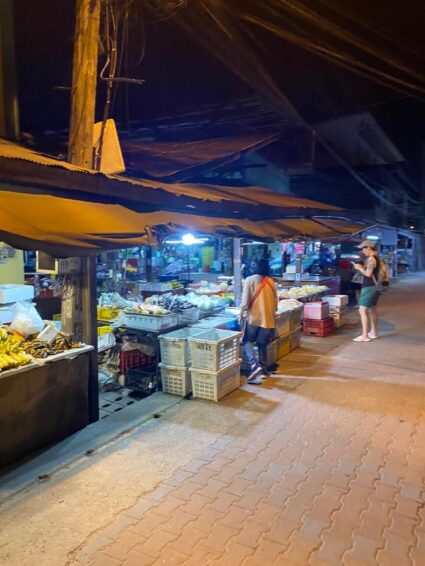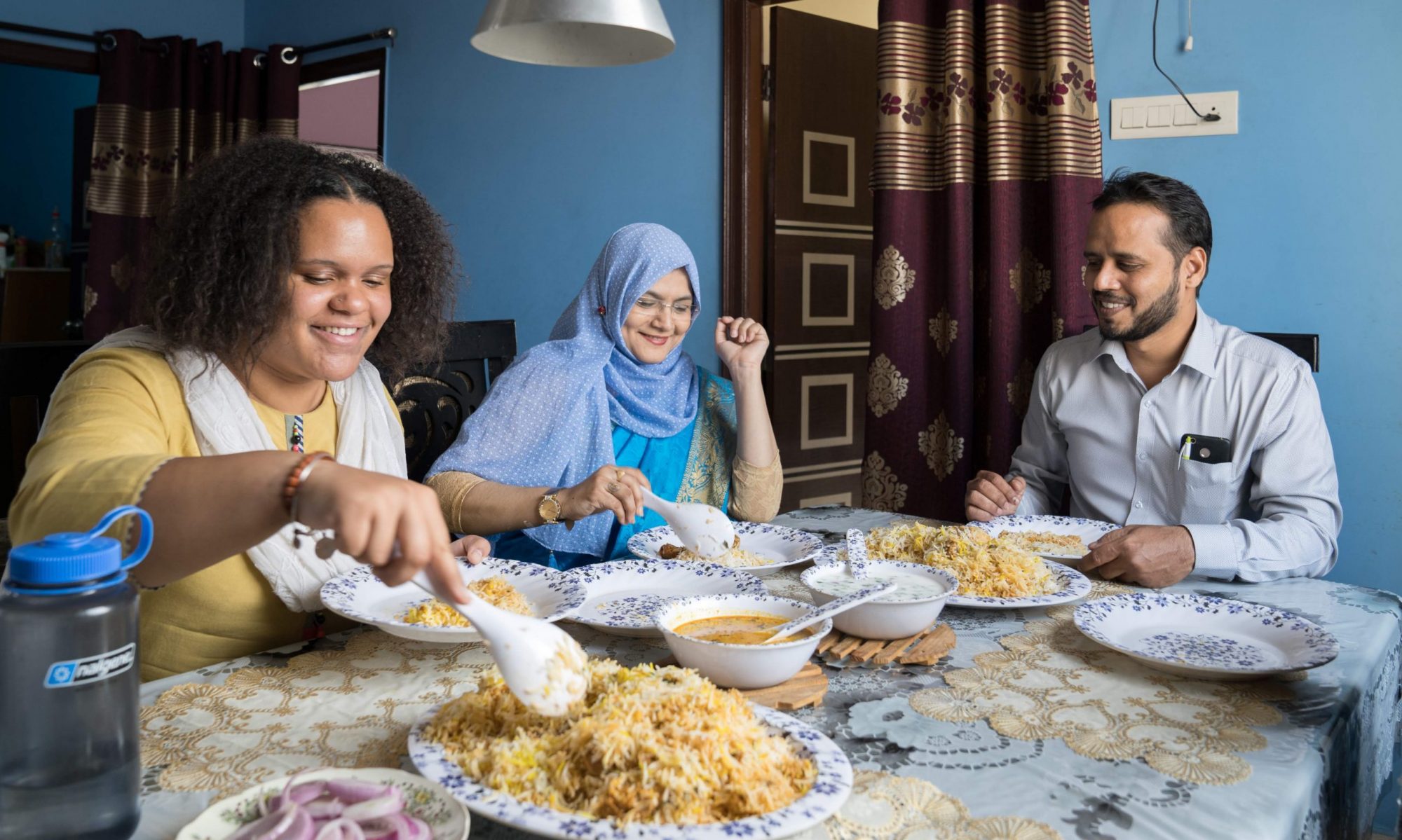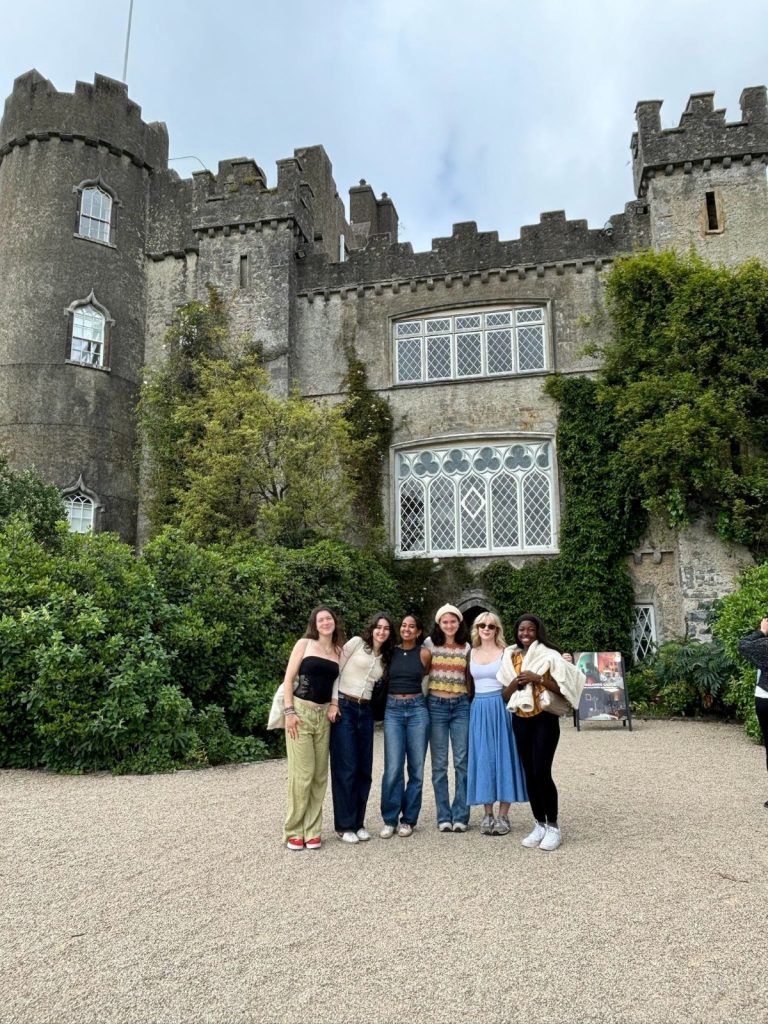by Belen, Nelson and Liam


Belén Arbelaez
On Tuesday, September 3rd at around 7pm, I stepped foot for the first time in a Thai market. Instantly overwhelmed by the colors and smells we stopped to look around and admire. There was chaos yet peace. Fresh fruit, raw fish, woven textiles, spices surrounded us, tables filled to the brim with food and clothes, yet everything was organized. Cumin, pepper, chili powder, turmeric, mustard seed, ginger, all compressed into neat little plastic squares. Ceramic baby elephants lined up, each with different vibrant colors and details. Rows of dragonfruit and mangostine surrounded us. While there was chaos, it was natural chaos, it felt as though people fit into their place at the market, tourists admiring, vendors selling and locals bargaining. Days later, in our Southeast Asian course, we read an article which allowed us to learn about the importance of the sense of taste and smell yet also the way these senses are ignored. When I made my way back to the market, I appreciated the smells, I took them in with acceptance and respect.
Nelson Chen: Dragonfruits, burning incense, and tropical rain
From the hints of seaweed and marine life that drift in from Boston Harbor Sea Port to the invigorating aroma of freshly sliced dragonfruits and the smell of burning incense combined with the earthly petrichor that lingers after a sudden tropical rain, I felt a symphony of scents unfold through the bustling markets of Chiang Mai. After a 22-hour long flight from the Boston Logan Airport to Chiang Mai International Airport, I was finally here. (This felt so surreal!). I’ve only read and seen small clips of this place on my TikTok For You Page, probably because of my browsing history filled with unhinged searches like “fun things to do in Chiang Mai,” “Chiang Mai night markets,” and obviously, “must try foods in Chiang Mai.” But absolutely no video clip could have ever captured the depth of the moment I was in. Here, I knew the experiences were much more vivid and much more alive. The market was like a breathing canvas, painted with the essence of Thai locals alongside their stories and relentless energy that thrived on the convergence of cultures and religions. At that moment, I realized that I wasn’t just walking through a market––I was walking through what I would be calling home for the next three months.
To my friends, family, and loved ones back home, I can’t wait to spend countless number of hours sharing my experiences and stories with you guys! Our adventures are just beginning!
Liam Ferguson
I had only ever been to farmer’s markets. I had only ever really been to farmer’s markets in Memphis before coming to Chiang Mai, and that was kind of what I expected. The farmer’s market I would usually go to back home was run only during the summers, and was set up in a parking lot downtown. For the most part, though, I enjoyed going there. There were people selling fruits and vegetables, as well as those who called themselves “less traditional farmers” selling handmade jewelry, and even honey farmers who would give you as many free samples as you wanted. It was somewhere that I had memories of visiting as a kid, and a place I always saw as a source of joy. So when we went to visit the local market in Chiang Mai on our third day, I (sort of naively) expected something similar to the farmer’s market I was familiar with back home. This was not the case. When walking towards the market, I didn’t really see it coming. I just turned a corner, and then I was just sort of… in it. Looking around me, I was a little confused for a second. Then I realized. This was ALL the market. It looked like it stretched for miles. Endless numbers of stalls selling everything you could possibly want. There were stalls selling clothes, coffees, juices squeezed right in front of you, foods better than what you could find at any restaurant, and a wider variety of fruits than I had seen in any supermarket. But the most noticeable detail about the market was the smell. It was almost like there was an invisible barrier protecting the market’s smell from escaping into the rest of the world. As soon as you walked in, you were immediately hit with the smell of meat being freshly grilled, fruits you didn’t even know existed, and the Thai phenomenon called “Tiger Balm”, which can be used to cure pretty much anything. In our History of Southeast Asia class, we talked about how the culture of smell impacts southeast Asia, and how this differs from the western world, where smell is relatively unimportant. With this in mind, I can look back on our trip to the market and recognize that the market’s scent created a feeling of adventure and curiosity to explore. This feeling I think encapsulated not only our motivation to spend hours roaming the market in search of nothing in particular, but will encapsulate our experience and exploration of Thailand as a whole.
Originally posted here.








